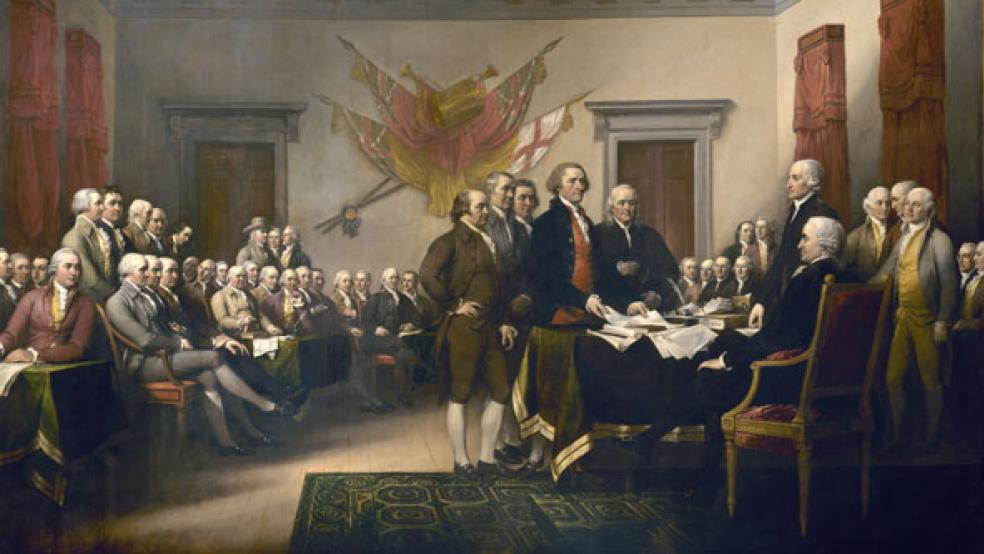I spent part of my Fourth of July weekend at the new Museum of the American Revolution in Philadelphia. Amid George Washington’s war tent and a replica privateer ship were an abundance of pocket-sized copies of the Declaration of Independence. As every red-blooded American should, I sat down and read one.
We all remember from junior high that the Declaration reads mostly like a long airing of grievances on Festivus. Thomas Jefferson, broadcasting to the world (and potential military funders) as much as England, stressed how the colonists entered into independence not with impetuousness, but only after a “long Train of Abuses and Usurpations” from which they tried repeatedly to gain relief. And I want to highlight one of the main abuses identified: an 18th-century version of building the wall.
Related: Of Fireworks, Hot Dogs, and Why July 4th Really Counts
“He has endeavored to prevent the Population of these States,” Jefferson writes, “for that Purpose obstructing the Laws for the Naturalization of Foreigners; refusing to pass others to encourage their Migrations hither, and raising the Conditions of new Appropriations of Lands.”
Most people remember the causes of revolution as taxation without representation, or police-state occupation of Boston and elsewhere by British officers stationed among their subjects. But preventing population flow played as critical a role, and reflecting back 241 years later it’s important to understand why.
A group of American colonists mostly born on British soil would naturally object to the artificial blockade of people into their territory. They benefited from the free movement of citizens across the British empire, and expected such migration to continue. But there was a larger context, an economic component that assumed new entrants to the colonies grew opportunity rather than hindered it.
Related: Trump Can Grow the Economy or Cut Immigration. He Can’t Do Both
Immigration had enhanced America throughout the 18th century. New settlers from the British Isles and continental Europe were critical to economic development in the colonies, building cities and staffing industries. They concentrated in the south and western frontier, but were generally welcomed everywhere because of their economic impact. Manufacturers enjoyed abundant labor, merchants saw new demand for their output and the general welfare benefited. And of course, the immigrants themselves prospered, not just economically but personally; as Thomas Paine writes in Common Sense, the colonies long served as “the asylum for the persecuted lovers of civil and religious liberty.”
American colonies established laws for naturalization of these immigrants throughout the 1700s, with varying degrees of permissiveness. While this policy was as hotly debated as anything else in colonial America, the general trend, as Jefferson summarized in Notes on the State of Virginia in 1785, “is to produce rapid population by as great importations of foreigners as possible.” Colonial leaders like William Penn took trips to Europe to promote migration as an opportunity for a better life. Many took his advice.
Britain initially encouraged this virtuous practice. For 20 years Parliament subsidized immigrants to populate the colony of Georgia. But in 1773, Parliament prohibited all American colonies from passing their own naturalization acts. They were fighting an economic war: By denying new entrants, the British Crown consciously suppressed the colonies’ ability to expand and grow richer.
Related: A Basic Problem With Trump’s Plan to Deport Undocumented Immigrants
We shouldn’t map all 21st-century sensibilities onto this era. Rapid development and immigration in colonial America obviously came at the expense of the natives who lived and prospered on the land already. And only white landowning men received the full rights of citizenship. But the larger point is that the Founding Fathers saw value in attracting and integrating people from all over the world into their society, because it improved the lives of both the established citizens and the new arrivals. It built up the nation’s wealth and industry. And when the British tried to staunch that flow of immigrants, it became one of the animating factors for rebellion; an act of war, effectively.
The importance of the immigrant, then, was not rediscovered in a rap song from Hamilton. It’s present in the founding documents.
Fast-forward to the Trump era, and we have a near-total rejection of these principles. Under the radar, a brutal crackdown on immigrant communities advances with far too little public awareness or outrage. Parents have been arrested for the crossings of their unaccompanied minor children, many of whom are refugees fleeing violence. Undocumented immigrants are getting picked up on the way to their morning coffee shop, or outside courthouses. Grandfathers are pulled from grandsons, husbands from wives, asylum seekers from their one chance at survival.
Related: Trump’s Wall Could Cost $70 Billion
The inhumanity of this crackdown should be obvious. Through the lens of colonial America, so should the deliberate sabotage of the country’s economic vitality. Dallas Federal Reserve President Robert Kaplan said it out loud recently when he explained how millions of immigrants fearful of deportation are “more likely to save than to spend,” undermining the economy. In addition, as Baby Boomers age, preventing immigration denies a pool of willing workers and entrepreneurs; in fact, immigrants are nearly twice as likely to start a business as native-born Americans, according to the Kauffman Foundation.
“If we do things that limit sensible immigration, we're likely to slow GDP,” Kaplan concluded.
Article I, Section 9 of the Constitution actually prohibits Congress from stopping the flow of immigration for 20 years. Promoting immigration has been a bedrock of America, not merely since the placing of the Statue of Liberty in New York Harbor, but since before there was an America. Celebrating the Fourth of July should be concurrently a celebration of the different ethnicities and cultures that make America great, and prosperous. We don’t just debase ourselves by tossing out productive members of society in a xenophobic fury. We harm our own futures.






